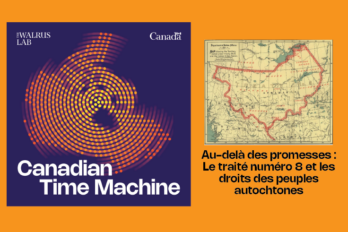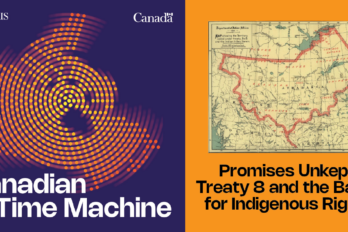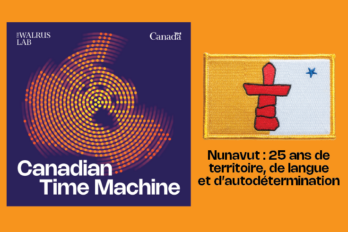ADVERTISEMENT:
HOST: Humans have an innate desire to explore. It’s what drove our early ancestors to migrate out of Africa and why modern humans dream of one day landing on Mars.
But according to Kate Harris, we don’t need to travel to another planet to satisfy our collective need for exploration. We just need to find a deeper sense of belonging to the one we live on.
Welcome to the Conversation Piece.
KATE HARRIS:
All right, good evening everyone. My name is Kate Harris and when I was a kid, I wanted to be an explorer and I mean, an explorer in the like historic great generalists sense of the term. You know, one of those intrepid Shackleton or Nansen styles with a knack for slogging and a disdain for the status quo. And ideally a spare euphoric prose style. But I grew up in small town, Ontario. So if you’ve, if you’ve been there, you know, that there aren’t many mountains, there aren’t many deserts. There aren’t many of the places that explores tend, tend to go. Um, so I looked around the tallest mountain I could see was a haystack. The widest horizon was a field of corn and it was pretty clear I’d been born centuries too late, or at least provinces away from the kind of life I was meant to live.
And the more quaint my surroundings, the more I craved the total opposite. And I wanted the sort of wildness that could, that could wipe me out if I wasn’t equal parts, bold and careful. And in small town, Ontario, where I found that wildness was in books. And one of my favourites when I was really little was this children’s illustrated edition of Marco Polo’s travels on the silk road. Silk road was an ancient caravan route that for a thousand years, and in some ways still, ferried people, goods and ideas from Europe to Asia and back. So from the Black Sea to the Tibetan plateau, and as a kid, I was desperate to see these places, but my family could never afford to travel. And I was worried that by the time I could actually, you know, work and, and save up enough to go there myself that they’d be as fenced over and paved and tame as Southwestern Ontario.
And so I realised that my only safe bet was to look beyond this planet. And in my teens, I decided that the rational thing to do was to become a scientist with the goal of someday immigrating to Mars. Now, I think most teenagers long for another world, but as far as I could tell where I grew up, I was the only one in my little town that pined specifically for the red planet. And I studied really hard in hopes of, of launching there someday. And I didn’t doubt my extraterrestrial mission in life until I had the chance during university to spend two weeks in Hanksville, Utah at a place called the Mars Desert Research Station.
Now Hanksville is best known as the, the former desert hideout of Butch Cassidy in the wild bunch. It’s where they’d go to shake off law, enforcers and amaze of red canyons. And today those same canyons host a slightly less wild bunch of researchers that come from all over the world to wear mock space suits, and basically go through all the motions of living on Mars in order to prepare for someday going there. So for a while, this was fun. It was kind of like this grown-up game of make-believe. But as I trudged around Utah wearing this canvas onesie and a plastic bubble on my head, I was pretty disconcerted by the fact that whenever I looked at a mountain, I saw this veneer of Plexiglas. And whenever I reached out to touch canyon walls the colour of embers, I just felt the synthetic fabric of my glove. And as all kinds of weather howled outside my space suit, all I could hear was the radio or it’s static or my own percussive panting, like I was breathing down my own neck.
So the very technologies that that would keep me alive on Mars made me feel at a deep remove from the place, all my interactions with it neutered and sterile, and, and more than slightly absurd. Especially when we ran out of food on the red planet, and we had to go to the local grocery store, wearing space suits to resupply our rations. So after two weeks of following orders, speaking in acronyms breathing recycled air, I’d kind of had my fill of living on Mars, and I was really homesick for my native planet.
And the whole experience made me question, you know, what am I really after an exploration? And I questioned it even more, as I learned more about its kind of darker history – far from being secrets of truth and beauty, as I’d kind of naively believed. Many explorers, like Marco Polo were actually servants of commerce and conquest, with really brutal consequences for the, the places and the people that they claim to have discovered.
Just ask those Indigenous to this place we call Canada now. And I wanted no part in that. What I longed for and what I exploration really for the, the lack of a better word was the feeling I got when I, when I looked up at the stars or when I read a really gorgeous poem. And I realised that I craved the same thing from, from both exploration and literature. I wanted life or language to pummel me with its power – I wanted a kind of intimacy with immensity.
So logically instead of going to Mars, I decided to bike the silk road. It turns out you don’t have to go very far to feel like you’ve launched to another world – you can just go to Uzbekistan. And it was so hot there by day that my friend, Melissa and I, my travelling companion, resorted to biking at night and the desert was so dark and so flat that it was as if the constellations came right down to Earth with stars hovering all around us at eye level.
And so it was like we were travelling to them or through them. And in a way it was like being on Mars only better because I could breathe. I could laugh out loud. I could feel the wind on my face. And space suits, as I learned in Utah, really wall you off from a lot.
You know, we long our whole lives for, for things we’ve never known and places we’ve never been – abstractions like happiness and success and exploration that we sort of affix to certain achievements and lives, and in my case, planets. But abstractions can come alive to us in such unexpected ways. And I think it’s very easy to get stuck on, on the letter of a thing, as opposed to it spirit and on the specifics of an enterprise, as opposed to its essence.
And as I see it now, exploration really isn’t about planting flags and leaving footprints. It isn’t about how far you can go and how much you can suffer along the way. It’s really about how willing you are to let an experience rewrite your maps. And the poet TS Elliott famously said that the end of all, our exploring will be to arrive back where we started and know the place for the first time. But I don’t actually think he went far enough there. I don’t think the point is to get to know this pale blue dot we all call home, to map it in ever more detailed ways or even to know the universe in we’re situated.
I think the point is to come to care for this place. To feel a sense of, of loyalty and belonging to it, because for all it’s flaws and it’s fences, it’s kind of the best thing we have going in the universe.
It’s the only place we can breathe. And I don’t think we need any better reason than that to really look after it. So that’s, that’s ultimately what my great, my great hope is for exploration, in the world, beyond the world and in words. That’s what exploration can do these days. It can wake us up to wonder it can shake us from our complacency and it can make people fall so in love with this in it, that they’ll never be tempted as I once was to abandon it for Mars.
Thank you.
HOST: Kate Harris is the author of Lands of Lost Borders. She spoke at The Walrus Talks: Exploration in 2020. And she’s just one of the over 800 fantastic Canadians who have wheeled, walked, and webcammed onto the stage at The Walrus Talks.
Our next event is coming up on April 20th, The Walrus Talks at Home: Pharmacare. Register today at thewalrus.ca/events.




